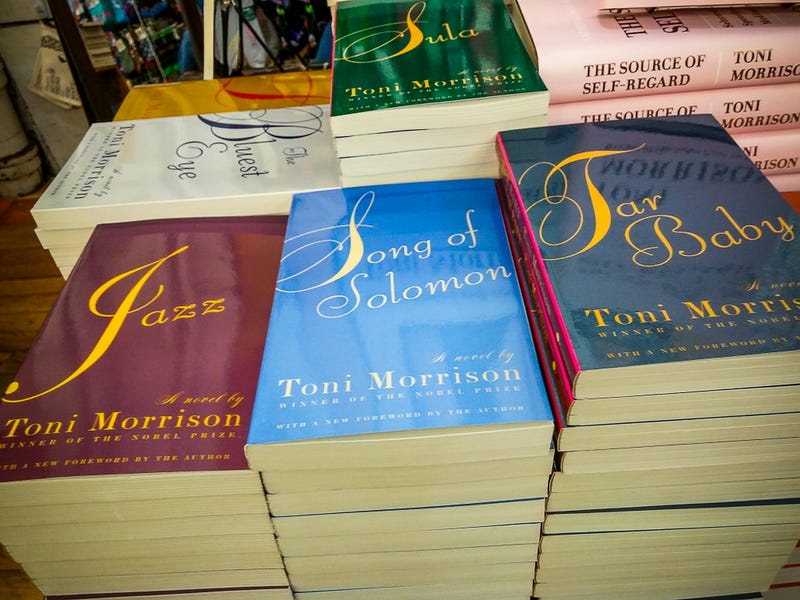
PHILADELPHIA (KYW Newsradio) — Opponents call them book bans. Supporters say they are a way to regulate graphic and inappropriate content. The debate over what should be in school libraries has become the latest vanguard of the culture wars, and some communities in southeastern Pennsylvania are being torn apart.
Jamie Tromba with the Bucks County chapter of Moms for Liberty said the movement to review books in school libraries gained steam during the height of COVID-19, when kids were attending classes virtually and parents saw firsthand what they were being taught.
“It really, I think, invigorated people to get back into the process of understanding: Hey, what exactly is going on in my school?” she said.
This debate is dominating school board meetings across the U.S., and politically divided Bucks County has become a hotbed.
The Central Bucks Board of School Directors passed a policy last July that allows parents and community members to challenge books for potential removal from school and classroom libraries. The policy is akin to a law Florida passed in March 2022 that helped spark a national debate and spurred action from school boards across the country.
In Central Bucks, dozens of books have been challenged, including Nobel Prize-winner Toni Morrison’s “The Bluest Eye,” which features several sexually explicit passages. The site Book Looks has become a resource for groups like Moms for Liberty to help flag possibly objectionable content.
It’s unclear when the board will make a decision on the challenged books and how outcomes will be communicated to the public.
Tromba said they are not fighting to “ban books” but instead give parents more say on what books their kids have access to in schools, particularly when it comes to graphic sexual content.
“If a parent wants to provide that book, by all means they can go and provide that book,” she said. “I don’t believe it needs to be on a bookshelf in a school, where every child has access to it, some way or another.”
But for many students, the school library can be the only option for a diversity of books.
“Access is extremely important,” said Pennsylvania School Librarians Association President Aimee Emerson. She says school librarians are often teachers first and are trained to select books for their school to represent every child.
“A lot of the books that people want to remove have certain points of view, certain perspectives. And it's almost like they want to silence these groups,” said Emerson, who notes a significant portion of books that are regularly challenged have LGBTQ themes.
“Any amount of censorship really narrows the scope of what a school library can offer their students.”
Tromba says parents aren’t targeting a specific group; they’re focused on specific content.
“Anything that’s gonna get explicit about the sexual experience, explicit about sexual organs, and how to pleasure them,” Tromba explained. “That is pornographic, in my opinion. And I think many people would agree if they saw some of the imagery of these books.”
The graphic novel “Gender Queer” by Maia Kobabe, for example, is often challenged.
“It’s very explicit and very sexual imagery — very, very strong sexual imagery,” said Tromba. “You have full-on frontal male. You have male pleasuring another male.”
Book challenge processes have cropped up in several other districts in the Philadelphia region in the past year, including West Chester and Pennridge. Last March, after a challenge from residents, West Chester’s board voted to keep “Gender Queer” on the shelves.
Emerson said it’s also worth considering the book as a whole, and the context around the sections people find objectionable. “Most of the time, these authors, even though it's very dramatic, and there are some points that maybe are concerning, in the end, their message is hope,” she said. “And that's really what we want.”
In Central Bucks, the board’s consideration of book challenges is the latest move that has the LGBTQ community on edge.
In January, the board approved a revision to its controversial Policy 321, which bans teachers from displaying flags, banners, photos and other items that take a side on a political or social issue. Parents who opposed the measure argue it is anti-LGBTQ, as it prevents teachers from displaying pride flags in classrooms. Board leaders have disputed that as the intent of the policy.
Regarding books, school librarians have argued that they are equipped to make age-appropriate decisions for what to make available to students. Emerson says schools and school librarians are willing to work with parents, but they need to be wary of individual complaints that drive decisions that affect entire communities.
“A parent cannot direct other students,” she said. “They can’t make the decision for every student.”
Tromba said parents in favor of stricter policies are not trying to tell other people what to do; they are simply trying to have a say in how their own children are raised. “[Parents] need to understand what is able to get in the hands of their kids, and they need to be able to make the decision: ‘That's not appropriate, according to my values and how I'm raising my child.’”




